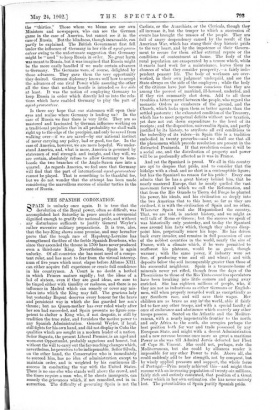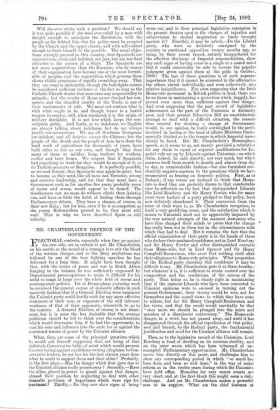THE SPANISH CORONATION.
SI PAIN is unlucky once again. It is true that the devolution of the Royal power, often so difficult, was accomplished. last Saturday in peace amidst a ceremonial dignified enough to gratify the national pride, and without any disturbance sufficient to justify General Weyler's rather excessive military preparations. It is true, also, that the boy-King shows some promise, and may hereafter prove that the tough race of Hapsburg-Lorraine has strengthened the fibre of the feeble Spanish Bourbons, who since they ascended the throne in 1700 have never produced even a third-rate King. Nevertheless, Spain is again unlucky. Of all countries she has most need of a compe- tent ruler, and has most to fear from the virtual interreg- num of five years which must elapse before Alfonso ICILE. can either acquire full experience or create full confidence in his countrymen. A Court is no doubt a hotbed in which Princes mature rapidly ; but the ideas of a lad of sixteen, even if they are good ideas, are sure to be tinged either with timidity or rashness, and there is no influence in Madrid which can remedy or cover any mis- takes into which the King may fall. The gracious lady but yesterday Regent deserves every honour for the brave and persistent way in which she has guarded her son's throne; but no Queen-mother has ever ruled wisely after her son had succeeded, and Spain presents no figure com- petent to shelter a King who, if not despotic, is still by tradition the true ruler, and furnishes the motive power to any Spanish Administration. General Weyler, if loyal, still fights for his own hand, and did not display in Cuba the qualities which are sought in a modern leader of a nation. Seiior Sagasta, the present Liberal Premier, is an aged and worn-out Opportunist, probably sagacious and honest, but without the will to carry out the far-reaching changes which, nevertheless, he perceives to be indispensable. Senor Silvela, on the other hand, the Conservative who is immediately to succeed him, has no idea of administration except to maintain order, and is weighted by his continuous ill- success in conducting the war with the United States. There is no one else who stands well above the crowd, and the times require a man who, if he shoots insurgents, can remedy the grievances which, if not remedied, end in in- surrection. The difficulty of governing Spain is not the Carlists, or the Anarchists, or the Clericals, though they all increase it, but the temper to which a succession of events has brought the masses of the people. They are full of angry despondency caused by the result of the American War, which has stung their deep historic pride to the very heart, and by the impotence of their Govern- ment to secure for them either external repute or the conditions of contentment at home. The body of the rural population are exasperated by a tenure which, while it exacts hard work for a maintenance, leaves them no chances of what they consider prosperity,— a fairly inde- pendent peasant life. The body of workmen are over- worked, in their own judgment underpaid, and see the State always on the side of the employers ; while the body of the citizens have just become conscious that they are among the poorest of mankind, ill-housed, underfed, and if they riot summarily shot down. Add to all these troubles a bitter quarrel between the people, who regard the monastic Orders as cumberers of the ground, and the Church, which looks upon them as better agents than the settled pastorate ; the exhausted condition of the Treasury, which has to meet perpetual deficits without new taxation, yet dare not cut down expenditure to the level of its receipts ; and the disposition, universal in Spain, and partly justified by its history, to attribute all evil conditions to the imbecility of its rulers—in Spain this is a tradition embodied in twenty proverbs—and we shall see that all the phenomena which precede revolution are present in the distracted Peninsula. If that revolution comes it will be a social one, and the distribution of property and power will be as profoundly affected as it was in France.
And yet the Spaniard is proud. We all in this country are apt to despise that pride, and to consider that the hidalgo with a cloak and no shirt is a contemptible figure ; but has the Spaniard no reason for his pride? Every one admits that he has a. great history behind him, that he nearly mastered Europe, that he nearly quelled the vast movement forward which we call the Reformation, and that from the Rio Grande to Tierra del Fuego he planted his power, his ideals, and his civilisation so deeply into the two Americas that to this hour, so far as they are civilised, it is with the civilisation of Spain and no other. Wherever Spain trod she Hispa,niolised the country. That, we are told, is ancient history, and we might as well talk of Rome or Greece ; but the success we speak of was historically only yesterday, and to-day the Spaniard sees around him facts which, though they always disap- point him, perpetually renew his hope. He has driven back every invader, and remains in full possession of one of the noblest countries in the world, nearly the size of France, with a climate which, if he were permitted to reafforest his plateaux, would be as good, though warmer ; with the same power, if industry were set free, of producing wine and oil and wheat ; and with deposits below the soil incomparably greater than those of his successful neighbour. Spain is a treasure-house of minerals never yet rifled, though from the days of the Phoenicians to those of the Rio Tinto countless speculators have been breaking into little corners and going away enriched. She has eighteen millions of people, who, if they are not as industrious as either Germans or English- men, will when properly rewarded work as energetically as any Southern race, and will save their wages. Her children are as brave as any mill the world, able if fairly led to face any other troops, and'with a special faculty at once of endurance and abstinence which scarcely any other troops possess. Seated on the Atlantic and the Mediter- ranean, with a nearly impenetrable frontier to the north and only Africa to the south, she occupies perhaps the best position both for war and trade possessed by any European State, and. might with a decent Administration and a new revenue become once more as great a maritime Power as she was till Admiral Jervis defeated her Fleet off Cape St. Vincent. She could not, perhaps, rule the Mediterranean, but she could by alliances render it impossible for any other Power to rule. Above all, she could suddenly add to her strength, not by conquest, but by wisely applied pressure and support, the whole force of Portugal—Print nearly achieved this—and might thus resume with an increasing population of twenty-six millions, fairly rich and entirely contented, that position of a Great Power which in her own estimation she has never entirely lost. The potentialities of Spain justify Spanish pride. Will she ever attain such a position ? We should say it was quite possible if she were ever ruled by a man with insight enough to anticipate the Revolution, with the people so far behind him that his policy must be accepted by the Church and the upper classes, and with self-control enough to limit himself to the possible. The usual objec- tions strongly pressed in this country, that Spaniards are superstitious, cruel, and indolent, are just, but are not final obstacles to the success of a State. The Spaniards are not more superstitious than the Russians, who by reason of their organisation have become one of the most formid- able of peoples, and the superstition which governs them shows visible symptoms of rapidly crumbling away. That they are cruel is undeniable, though the bull-fights cannot be considered sufficient evidence of the fact so long as the Catholic Church denies that man owes any responsibility to animals ; but the cruelty of Rome never checked her con- quests, and the dreadful cruelty of the Turks is one of their instruments of rule. We must not confuse what is with what ought to be, and though terror is a horrid weapon to employ, still, when regulated, it is the origin of military discipline. It is not love which keeps the con- scription going. And lastly, as to indolence, we English are always talking about indolence, but do not always justify our accusations. We say all Southern Europeans are indolent, and all Asiatics except the Chinese ; but the people of the South and the people of Asia have done the hard work of agriculture for thousands of years, have built cities as fine as our own, and though they doze many of them at midday, keep, workers for workers, earlier and later hours. We suspect that if Spaniards had something to work for they would do enough of it, as do Turkish peasants or Bengalees. It is perfectly possible, as we read history, that Spaniards may again be great; but to become so they need, like all races not Teutonic, strong and coercive leadership, and for that they must have a Government such as for another five years, probably years of storm and stress, would appear to be denied. The Southerners can no more do without chiefs than Asiatics can, and have as little the habit of finding them through Parliamentary debate. They have a chance, of course, in their new King ; but for him, even if he is as competent as the young Hohenzollern proved to be, they must still wait. That is why we have described Spain as still unlucky.







































 Previous page
Previous page